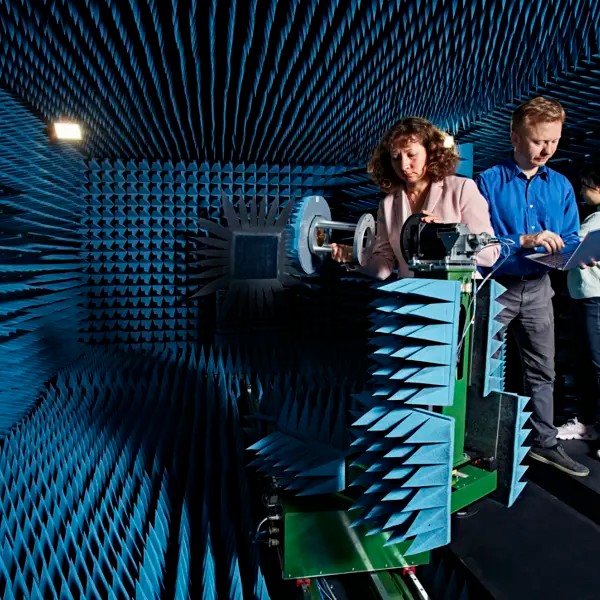
Marianna Ivashina is an antenna researcher who is passionate about continuous learning. She enjoys defining research programmes with interdisciplinary challenges and engagement across academic and industry domains. As the director of a competence center, she has the opportunity to collaborate with partners in both worlds.
"I love looking into the future and doing it together in a team with different skills."
The work of the Areas of Advance is interdepartmental and for the Information and Communication Technology (ICT) Area of Advance, this can mean supporting research on ICT tools. But what does this mean in practice? We met Marianna Ivashina, professor and director of the Antenna Systems research group at the Department of Electrical Engineering at Chalmers University of Technology, to learn more about her research and how it relates to the ICT field.
Hi Marianna! What are you working on?
"I am researching antenna systems, which is one of the central components of modern wireless communication and sensor systems. This work often requires the development of both hardware and software solutions to achieve design with the desired performance when antennas are built into the entire wireless system, making it both challenging and creative at the same time."
Marianna’s work also involves teaching, and she is currently supervising six PhD students in different research directions in antenna research.
In addition to conducting research and teaching, Marianna also heads the competence centre WiTECH, Wireless Infrastructure Technology Centre at Chalmers. The centre, which has about 150 participants from 18 industry and academia partners, will pave the way for sustainable 6G telecommunications, energy-efficient semiconductors and integrated systems.
"I see it as my task as centre director to facilitate a work environment based on openness, respect and trust, where industrial needs, research expertise and education are combined and shared."
This approach, to share knowledge and experiences, is central to Marianna and reflects in everything she does.
How is your work linked to ICT?
"In communication systems, antennas play a critical role in ensuring efficient signal transmission and reception. Many future ICT applications will rely on innovative antenna systems, such as smart cities and connected vehicles for efficient logistics and transport, autonomous industries for efficient production, augmented reality for better healthcare, etc. A particular example to mention is the vision for the sixth generation of wireless telecommunications (6G), which aims to unify communication with sensor networks and computing tools to provide digital services in a reliable, inclusive and sustainable way.
Why is your work important?
"An important feature of an antenna is its ability to transmit and receive electromagnetic waves in specific directions while suppressing signals in other directions, as a kind of directional filter. This directional filtering enables reliable, fast, wireless communication links in a variety of applications. This may include telecommunications such as the connection of mobile phones to base stations, or safety-critical communication between vehicles and air traffic control. It can also be antennas that detect natural electromagnetic emissions in space and on Earth, which can be important for understanding cosmic phenomena, tracking weather patterns and measuring the effects of solar radiation. Antennas are also used in several other areas, such as biomedical diagnostics and in quantum research."
What attracts me most is the interdisciplinary nature of antenna research.
What do you find most interesting in your work?
"What attracts me most is the interdisciplinary nature of antenna research. Throughout my professional career, this has given me the opportunity to collaborate with experts in a variety of fields. From space and environmental sciences, radio astronomy to semiconductor technology, digital signal processing and machine learning. The creativity required to solve complex challenges – such as designing antennas that adapt in real time or integrating them with advanced semiconductor electronics – is incredibly satisfying."
Marianna enthusiastically discusses the importance of having an open mind and seeing the big picture. As well as the value of being part of a larger, global, research community. Both to learn from each other and to exchange lessons and experiences in research. But also, to see how other universities arrange larger conferences, as inspiration for own events to be constructive and interesting for everyone to participate in.
"Working in an academic environment also means that I can see young talents grow and contribute with new ideas, which is both inspiring and rewarding. What are important motivators among young people changes over time. And working with young people also keeps my mind young."
Marianna continues to explain how she appreciates the dynamics of working together. Both in the research area itself and how you interact with the rest of the team. Leading a competence center like WiTECH also gives her the opportunity to work with everyone from young students to senior researchers.
“It's the Circle of life!” Marianna exclaims, referring to the cartoon The Lion King, and continues, "I feel lucky to have this kind of work. I don't see it as my work, it's my passion.”
What challenges do you see?
"Today, there is a great demand for antenna experts in the wireless communication and sensor industry, both in Sweden and abroad. At the same time, attracting young talents to study in these fields is a challenge, while the rapidly changing geopolitical situation sets additional constraints."
Marianna therefore stresses the importance of specialised education programmes and outreach projects aimed at raising awareness among young people of the work opportunities available in this field.
Finally, what do you prefer to do when you're not working?
"Then I value quality time with my family. It's about simple things like taking a walk together or playing some sport. As I am very interested in education at different levels, I am very involved in my children's education. I think it's so interesting to learn about how they learn, which is very different from when I went to school. I want to be a part of their lives and see how they develop, what values they have and what choices they make. I think it's my passion."



